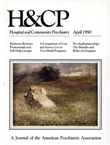Self-Help Groups for Former Patients: Relations With Mental Health Professionals
Abstract
Data from a national survey of 104 self-help groups for former mental patients were examined to assess actual and potential partnerships between these groups and mental health professionals. The groups' level of interaction with and attitudes toward professionals varied with the structure, affiliation, and service model of the groups. The majority were moderate "supportive" groups in which partnerships with professionals could occur but were problematic. Less common were radical "separatist" groups, with which professional partnerships were almost guaranteed to fail, and conservative "partnership" groups, with which partnerships were likely to succeed. Strong antipsychiatric attitudes throughout the mental patient movement suggest that mental health professionals who approach former-patient groups with narrow clinical conceptions of mental illness are likely to fail in establishing partnerships.
Access content
To read the fulltext, please use one of the options below to sign in or purchase access.- Personal login
- Institutional Login
- Sign in via OpenAthens
- Register for access
-
Please login/register if you wish to pair your device and check access availability.
Not a subscriber?
PsychiatryOnline subscription options offer access to the DSM-5 library, books, journals, CME, and patient resources. This all-in-one virtual library provides psychiatrists and mental health professionals with key resources for diagnosis, treatment, research, and professional development.
Need more help? PsychiatryOnline Customer Service may be reached by emailing [email protected] or by calling 800-368-5777 (in the U.S.) or 703-907-7322 (outside the U.S.).



